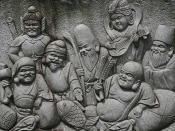During his youth, Saint Augustine attained a level of wealth and renown that many might consider indications of a life well spent. His rhetorical abilities provided him with a means to access nearly any form of bodily pleasure, a luxury that all people strive for and often confuse with true happiness. However, despite achieving what countless individuals hope for, Augustine realized that the life he was leading did not bring him happiness. The philosophies of Manichaeism and Neo-Platonism to which he previously adhered left him disillusioned and dissatisfied. The quest to fill his spiritual void led to his eventual adoption of Catholicism. Before making the commitment to God, Augustine underwent a lengthy process of addressing all of the questions that stood in the way of his full acceptance of God, and took the situations he faced as signs of God's overwhelming grace and willingness to accept humankind. This process included an extensive probing of God's nature, the realities of time, and the beginnings of Earth and the Universe: topics that Augustine felt must be confronted in order to base one's faith upon a foundation of reason.
This conversion of the mind was followed by a conversion of heart, a process that fulfilled Augustine's conversion by complementing his rationalization of God with true faith. The Confessions chronicles this exhaustive trial and gives us insight into Augustine's conversion from a life of sin to a life carried out in accordance with the rules of the Catholic Church.
To Augustine, God represents the sole constant in a universe that is continuously undergoing change. He is unwavering in his belief that God is imperishable, inviolable, and unchangeable. Were any of these three conditions proven false, it would imply that there existed a power capable of competing with God. God's knowledge is so all...


